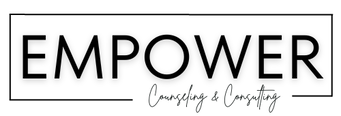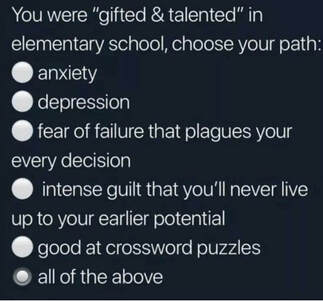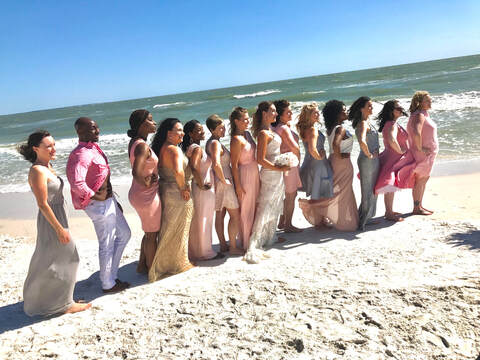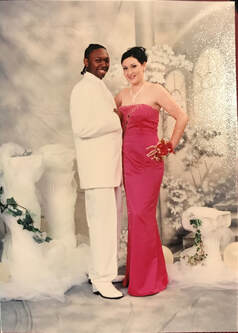My stomach turned and I wondered how I could email my way out of this. I think if she hadn’t walked out at that exact moment to call me inside (because no waiting rooms during Covid!) I would have bailed. “When did you know you needed to reach out to a therapist?”
Well...5 minutes before my client was due to arrive in my office, I found myself frantically trying to wipe away tears, fix my mascara, and make it look like I hadn’t just been bawling at my desk. That’s when. This particular client follows my (professional) IG account and I know she had seen me post earlier that week about the loss of a dear friend, so I’m sure she would have been understanding if she saw me having a moment. In fact, I think it’s important to let clients see that we are human and we don’t have our emotions under control every second of the day. However, we are trained to pack our stuff up and leave it at the door to be fully present with them, and I happen to believe I do it very well. In fact, I love being lost in someone else’s story so that I don’t have to think about mine sometimes. Here’s the thing: If you are a therapist and you haven’t done your time on the couch yourself, I worry for you. Not every profession requires you to have worn the shoe on the other foot. You don’t have to have experienced a heart attack to be a good cardiologist for example. But with our profession? I think it’s needed. So needed. And I think we are better therapists when we know what that level of vulnerability feels like. I pulled up psychology today and narrowed down my preferences. I’m fully aware that I only know my preferences because I know all the different options there are. I cannot imagine starting the journey of looking for a therapist without all the knowledge I have. The process is overwhelming.
This unicorn I was looking for didn’t exist, I was being way too picky. In fact, it didn’t populate a single therapist who I didn’t already have a professional relationship with. I had to let go of a couple of my expectations, and eventually landed on a therapist that is in the building next to mine who had an opening next week. Step One: Done. I spent the next week feeling absolutely silly and crazy. What did I even make the appointment for? There is nothing wrong with me. I shouldn’t need this. I’m actually fine. I don’t really need this. My life is not that bad. I seriously do not want to practice what I preach here. But nonetheless, I pulled up outside her office on Tuesday (with one minute to spare because I absolutely hate being early for appointments. It gives me anxiety) and I think for a moment “Wow- the people that come to see me are incredibly brave because I 100% don’t want to do this right now.” My stomach turned and I wondered how I could email my way out of this. I think if she hadn’t walked out at that exact moment to call me inside (because no waiting rooms during Covid!) I would have bailed. She leads me inside and I sit on her couch. I notice things I’m sure most clients don’t. How her chair is positioned closest to the exit for her protection in the event the client (me, right now) becomes violent. How the lighting is too bright in here and I pat myself on the back for the soft lighting I’ve set up in my office. I’m looking for something to tell me I’m not completely vulnerable here and somehow a slight criticism helps? I wonder what clients have criticized me for. I even notice how she sits, her body language, how hard she is trying to smile from behind her mask to make me feel comfortable. I immediately like her and I’m so relieved. I’ve seen two therapists in the past who I totally ghosted after the first session because I got a bad vibe from. Actually, they were probably perfectly nice, normal, and competent, but I wasn’t ready to be there. One lady exclaimed that my wedding ring was so “purdy” and I immediately wanted to end the session because I didn’t want to connect with her or her country accent. How insanely judgmental we can be when we are uncomfortable with ourselves. “What brings you in today?” There’s that big, open-ended question where I have to start somewhere when I have no clue where to start. I took the easiest way out and replied, “Because...2020?” She laughed, nodded in understanding, and gave me some validation. I thought back to what I wrote on her intake forms 30 minutes before I arrived (I’m a do-it-at-the-last-minute kinda client) which is for her biopsychosocial, but also to get me thinking about what I want to get out of therapy. The best way I can sum up what is bringing me in today is grief. 2020 has felt like loss after loss for me and the tears at my desk make me think that maybe it has finally caught up to me. The conversation flowed, but I was ready for the hour to end. I talked about things I didn’t expect to talk about- therapy works that way sometimes. I walked away with a lot to think about and a good feeling about seeing her again. Reaching out for help is hard. Getting started is hard. Opening up to a stranger is hard. But I know it is worth it. If you have found yourself wanting to do this but a million things have gotten in the way, I encourage you to reach out to me so I can help walk you through the process. I don’t have to be your therapist- I’m happy to help you find the best fit for you somewhere else. But I can certainly be a resource in helping you on this part of the journey. On the ride home I thought about several of my long-term clients who now walk in and say “OMG JULIE GUESS WHAT HAPPENED??” before they can even sit on my pink couch. They almost can’t wait to fill me in on their lives and they are so excited to share with me. I’m reminded that wasn’t how their first session was either and how long it’s taken for them to get there. And I wonder if one day I will be bouncing into Kristi’s office, ready to share, comfortable enough to cry, able to let her see me. For some reason the thought of that possibility makes me smile :)
3 Comments
The Whole30 team can warn you all day that it’s not about weight loss, but it is still your responsibility to know your own triggers. I’m seeing a lot of people gearing up for their September Whole30 adventure- cleaning out fridges, stocking up pantries, eating one last pizza and tub of ice cream before they have to give it up for 30-45 days (or possibly longer). (This is totally not recommended by the way! But I know y’all are doing it! :) Seeing all of these posts on Instagram really has me thinking and I want to share some thoughts as a former Whole30 Certified Coach and as a therapist with experience working with disordered eating. I want to look at both the benefits and, more importantly, the potential dangers of a program like this for this particular population. First let me share with you my background with W30. I have done several rounds personally and I have learned so much about my body, the way it tolerates food, and how certain foods impact my physical and mental health (yes! Your anxiety might have a lot to do with your diet!). After completing the rigorous requirements, I became a certified coach in January of 2019. (Trust me- they are not just handing these certifications out.) I hosted several group challenges over the next 18ish months, helping Whole30ers navigate the rules of the program, find motivation to stay the course, and get in touch with emotions as they became more aware of their relationship with food. It is hard work. I saw my group members come off of a multitude of medications they had taken for years, their lab work astonished their doctors, they were able to move their bodies and their joints in ways they hadn’t been able to (pain free) in decades, their sleep issues were resolved, the list goes on and on. I’m not exaggerating here. The results can seem miraculous. The power that the Whole30 program holds is simply based on the science that nutrition can either make or break your body in so many different ways. But here’s my problem: On day 31, there would always be at least one (often more) group member that would say to me, “My sleep is great, my energy is great, my digestion is great, I’m off of my meds, I’m running again...but ...I didn’t lose as much weight as I had hoped. It’s really disappointing. What can I do next to help with that? Should I stay on Whole30 longer and also start _____?” (fill in the blank with something like count calories, eat less fat, exercise more, eat less red meat, etc.) The fact that there was a “but” after they listed so many good things was always heartbreaking. Their solution was always more restricting. The Whole30 team will tell you over and over again that it is not a weight loss diet, should not be used as a means of losing weight, and if that is your goal, you need to find another way. But people don’t listen. People miss/ignore that part. They use the program incorrectly over and over again. (I was 100% guilty of this btw. Prior to becoming a coach, I didn’t read this part of the rules and regulations and I totally used it as another crash diet). So while I AM a supporter of the program, the team, the supportive community, and especially of using nutrition as a way of caring for your body and reversing/preventing chronic illness, I have serious concerns about people with a history of an eating disorder or disordered eating habits attempting the program. Whole30, by specific and scientific design, eliminates certain food groups that have the potential to cause intolerances in the body. The best way to see if a food is impacting you negatively? Remove it and see if you feel better! But, if you have a history of restricting your diet in any fashion that has led to disordered patterns, this experiment can be extremely triggering. Patterns in the past have labeled food “good” and “bad” and those labels become internalized depending on your plate. You are good when you eat good. You are bad when you eat bad. This becomes a deep core belief you have about yourself and it is very damaging. Whole30 is not saying a food group is “bad” but with a history of this kind of thinking, it’s incredibly difficult to separate your own disordered patterns from the intentions of the program. Healing from disordered eating includes taking the moral label off of food, having no restrictions around your food intake (unless advised by a physician), and healing from the need to control every bite that you consume. And you’re just not able to do that if you are trying to complete Whole30. Does it mean that you couldn’t benefit from Whole30? I’m not necessarily saying that either. You could complete the program with absolute perfection, follow the guidelines and meal templates to a T, and possibly (probably) have some of those wonderful results by the end. But in all likelihood, there is also a good chance it could send you into a shame spiral and harmful, restrictive patterns could resurface. And listen to me when I say- IT IS NOT WORTH IT. Again, I am not saying Whole30 is bad by any means. I’m still a big fan. I’m saying- for some people- the requirements are too similar to previously damaging patterns and this could be a bad idea for you. The Whole30 team can warn you all day that it’s not about weight loss, but it is still your responsibility to know your own triggers. If you are considering doing Whole30 and have a history of disordered eating or a diagnosed eating disorder, please reach out to your therapist and explore what is prompting that desire in their first place. It may be your eating disorder that is driving the decision to use this as a “healthy” way to restrict. If you are determined to do the program, please at least see your therapist weekly while you are doing it. Don’t go at this alone. It may seem like I’m making too big of a deal out of it, but I can assure you I’m not. Nothing is worth your peace and mental health. It needs to be protected at all cost here. Julie HiltonJulie is a Licensed Clinical Social Worker providing psychotherapy in person (Alpharetta) and online anywhere in Georgia. She specializes in helping empower women to shed the pressures and expectations of the world, and find peace in the identity God intended. If you are interested in working with Julie and would like to scheduled a free phone consultation, call 678-329-9129 today! Let me just start off by being honest here. This is not going to be my best blog post. I can’t seem to focus like I do some weeks. I can’t seem to articulate myself well. I actually don’t even know what exactly I want to articulate here. I’m writing it anyway and posting it is going to make me cringe a bit. I hope that does not stop you from reading. And I’ll explain more in a moment.
The past few weeks I have been exploring how Self-Worth impacts so many areas of our lives. I have written on Self-Worth as it relates to anxiety, depression, relationships, setting and holding boundaries, and now today I want to talk a little on how Self-Worth relates to perfectionism. If you have been reading along, you’ve learned that different experiences in our lives teach us things about ourselves. What we learn becomes what we believe. It’s ingrained in us and goes to our very core. Remember those beliefs like:
Perfectionism is one way the deep core belief that you aren’t “good enough” shows up and says maybe, just maybe, if you do things absolutely perfectly, you can finally believe that you ARE. It is a way of telling ourselves that we are only “good enough” when we are performing well. (THANK YOU school systems for putting such an emphasis on a letter grade and starting this cycle before we are old enough to even spell the word ‘perfectionism’.) The delusion of being perfect becomes our measuring stick. How unreasonable. We set ourselves up to fail. We have been conditioned to believe that we are constantly proving our worth through our performance. As an adult, that can be our performance on a work project, our annual review, our weight/appearance, what is on our plate, our children’s grades/sports, how kept our house is, etc. All these things are easy for us to “grade” ourselves on. When we look like we have it perfectly together, we can give ourselves a gold star and believe that we are good enough. The anxiety this causes!! Omg! The constant assessment of how we are measuring up. The never ending string of negative thoughts if things are not perfect. It is absolutely exhausting and the reason for many breakdowns and panic attacks. And here’s another problem: people tend to think that perfectionists are high functioning people. That’s not usually true though. Perfectionism doesn’t give us the motivation or ability to do things perfectly- it only tells us that if we DON’T, bad things will happen (like, people will find out that we aren’t good enough). It’s actually paralyzing. One of the most common characteristics of a perfectionist is extreme procrastination (which often leads to just not doing the thing). I keep saying “we” because it’s me. I have dealt with this for years (and am still working through it). It has taken me a week to sit down and write this blog just because I want to avoid this topic. Ya girl has been procrastinatinggg. And yes, it’s been paralyzing. How many of you have looked at your to-do list of house work on Saturday morning and it seems so overwhelming that you can’t even get started? Half of the day goes by and you just continue to beat yourself up for not starting, but can’t seem to get going because the list is too long to do in one day. All or nothing, black or white thinking. It either all has to be done and your house has to look like something out of Southern Living, or there is no point in even trying. It’s impossible so you just don’t bother. Here’s where we have to do the work of separating our self-worth from the task at hand. The house (or the article) is not a representation of your worth. I am good enough when I write an average article. It doesn’t have to be mind blowing. It can still help people, which is my goal. The house doesn’t have to be spotless. It can have a few less spots from cleaning a few things, and the rest can be dealt with another day. Once we calm our spirit and recenter on what is really happening in front of us (putting this weight on our performance), it actually frees us to be able to do the thing (or at least part of the thing) that we have been so paralyzed from getting done. Hence me cringing ...but hitting “post” nonetheless. Once we recognize what impossible standards we are putting on ourselves, we can start to sort through what we actually want to believe and what we can choose let go of. If you are ready to start the journey of letting go of the unreasonable expectations you put on yourself- to be perfect and do everything perfectly- message me today and let’s start working on what life could look like without all these demands. That’s the issue here. Many people live their lives fully aware that boundaries would help and that they have the right to say no, but the fear of rejection, loss of relationship, or being told they are “wrong” for setting that boundary is too much to handle. Boundaries and Self-Worth. Two topics I could talk about all day. So much so that I had to get my shoes off, coffee in hand, comfy, and stretched out on my office floor just to write this.
Let me start by crediting the book Boundaries by Cloud & Townsend for the understanding and framework that I have about boundaries from a biblical and practical perspective. If you’ve not read it, I highly recommend it! When I talk with clients about boundaries (which I do with every client, very early on) I use the illustration (from this book) that boundaries are like fences. If you and I are next door neighbors and we have no idea where our property line is- it makes it difficult to know where to cut the grass. Where does my yard end and yours begins? If I am a people-pleasing, can’t stand for anyone to be mad at me, spread myself thinner than I should kind of person, I will more than likely cut a little more grass than I am actually required to, just to avoid you being mad that I didn’t cut all of my yard. If you, as a person, are a taker rather than a giver, you will gladly let me. This is why we need fences. Here’s the thing: most people think of fences as a way to keep unwanted things OUT of your yard, but they also keep you from doing other people’s work in theirs. If I mow beyond my property line I am using my resources, my time, and my energy to do work that you should be doing. I am allowing you to get out of doing your responsibilities. Not only does it drain me, but it supports your bad habits and tells you that it’s okay to take advantage of me. By continuing to cut your grass, I am also teaching you that this is okay. So now you see why setting new boundaries is so hard! One of my all time favorite quotes is, “The only people who get upset about you setting boundaries are the ones who benefitted from you not having any.” How powerful is that?? If I set a new boundary (aka I build a privacy fence) now YOU have to cut your own lawn. No more free labor! I could go on and on about boundaries here and why they are important, how to identify and set them, how to uphold, etc., but the point of this blog is how Self-Worth impacts your ability to hold boundaries. Self-Worth is simply understanding that your neighbor’s lawn is not your responsibility, that you have a right to say no to doing their work, and most importantly, that you will be okay if they don’t like you or your new fence. That’s the issue here. Many people live their lives fully aware that boundaries would help and that they have the right to say no, but the fear of rejection, loss of relationship, or being told they are “wrong” for setting that boundary is too much to handle. “I know I should tell my boyfriend I’m not comfortable with the way he talks to me, but every time I bring up something I want him to change, he threatens to leave.” Or maybe it’s not that obvious. Maybe it sounds more like, “It’s easier to just do what my mom says to keep her happy, otherwise I’ll have to listen to a lecture on what a bad daughter I’ve been for moving out.” Both of these examples are saying 1- I know that how I’m being treated in this situation is not okay, and 2- I’m not going to speak up because their anticipated response triggers a deep fear of mine. If you are having difficulty setting a boundary (and here’s a tip- guilt is a big indicator that there is an issue!), take a step back from the situation itself and ask yourself- what are you afraid will happen and what would it potentially happening say about you? That deep fear is a flaw in your Self-Worth. That’s where the work needs to be done. When you know your Self-Worth, you know you will be okay without people who treat you badly. When you know your Self-Worth, you feel confident that it is okay to make a life for yourself, away from your family of origin. When you know your Self-Worth, you can handle someone being upset with you and know that good relationships can weather tough days and change. If you can recognize that your Self-Worth is preventing you from setting healthy, much needed boundaries but don’t know where to go from here, please don’t hesitate to reach out for help. This is not easy work! You don’t have to do it alone. I am here to help. It’s like the old saying, “You can’t love someone else if you don’t love yourself first.” And you can’t love yourself if you don’t first know just how much you are worth. I have really good relationships in my life these days. People that have been around for a decade or more. Friends that knew me in my clubbin' days, my crazy hair color days, and my unfortunate boy-crazy days. Most even made it through grad school with me, when I thought I would lose my shit more than a few (dozen) times. I 100% believe that relationships with other people get better as your relationship with yourself gets better. I want to explore how the way you view/understand yourself and your own worth determines the quality of the relationships you allow in your life, by sharing a bit of my own story with you. I have never been the girl that didn't have girlfriends and I'm not the one that says, "guys are easier to get along with." I have always had the most amazing girlfriends in my life and they are such a blessing! In fact, I have so many close friends that for my beach wedding (which was super laid-back to start with), I literally didn't bother having official bridesmaids. There would have just been too many! I told everyone my color scheme and to pick something they felt comfortable in and just stand with me as I married my best friend. It was perfect. I have been lucky enough to never really experience what it's like to have fallout with a girlfriend. How have I gotten so lucky? I believe it’s because I know my worth in friendships and I am drawn to women who do too. Doesn't mean either of us are perfect, but I'm drawn to women who support other women, and I do the same. That’s why friendships have been so easy for me. Relationships, on the other hand, have been a different story. When it came to boyfriends, I consistently settled because that was an area I hadn’t yet found my worth. I had a couple of long term relationships, mixed in with a long list of one-monthers, with emotionally unavailable guys because I didn’t think I could/would be able to do any better! I spent over a decade of my life being a girlfriend when I wanted to be a wife. I was cheated on. Disrespected. Manipulated. And the funny thing is, the entire time I had this idea in my mind that I was strong, independent, and confident! But the way I allowed people to treat me showed a completely different story. Things didn’t change for me until, after a particularly painful breakup, I decided to be single (for the first time in my life), find myself, and take time to understand my mistakes. I asked myself the important question of, “Why do I keep ending up here and how can I get out of this cycle??” That is when I was able to develop my Self-Worth on my terms. Once I fell in love with not being given the message that I wasn’t good enough, I vowed never to let it happen again. I started to understand why I had always made decisions based out of fear of being alone. I forgave myself for the positions I put myself in and promised to take better care of myself in the future. This is how developing Self-Worth starts to change the way you function. You care for yourself so much better. You don’t settle, you don’t rush yourself, you find what real confidence looks and feels like. It allows for grace and compassion for yourself, forgiveness where needed, and it pushes you into unknown territory with a calmness that everything will work out for the best. This doesn’t just go for romantic relationships either. When you start to know your worth, you don’t allow family to use or mistreat you. Setting boundaries becomes easier because you care less about upsetting someone for just trying to protect yourself. It also helps you to function from a place of security- if you know your worth, you don’t overcompensate to keep people in your life! If they want to leave, it’s easy to let them go! It also begins to change the way you see and interact with others. You start seeking out people that have done this same internal work. Without realizing it, you look for people that know their worth and make themselves emotionally available too. For me, I realized that the person most available, the one that cherished me for who I am, and also knew my worth (even before I did), was this guy I had kept in the friend zone for 3 years.We got married 4 months later. Never had I ever imagined he would be my type, because my type had always been in line with my old beliefs about myself. If you are having problems in a relationship, I can guarantee that you need to do this work. I’m not saying you are to blame for where you are, and really not saying the other person is either- it's not about blaming at all. I’m only saying you need to take time to explore how this relationship got where it is, and what happened prior to it that had already planted the seeds about your worth. It’s like the old saying, “You can’t love someone else if you don’t love yourself first.” And you can’t love yourself if you don’t first know just how much you are worth. -Julie Julie Hilton, LCSWJulie is a licensed psychotherapist working in Alpharetta, GA. She specializes in empowering women to shed the pressures and expectations of the world, and find peace in the identity God intended. Click here for more information about her services. “The opposite of play is not work- the opposite of play is depression.” If you had the chance to read my blog last week about Anxiety and Self-Worth, thank you! I would love to hear your feedback on it and if any of it resonated with you. If you haven’t landed here before- I am doing a series of blogs right now discussing how your Self-Worth, whether positive or negative, impacts so many issues that we face in life. This week I’m moving on to how Self-Worth plays a part in depression. Let’s jump in.
If you don’t know who Brené Brown is, you need to. She is one of my favorite human beings and also a fellow social worker. (Google her. Read her books. And especially watch her Netflix documentary, “The Call to Courage”.) I absolutely love this quote from Brené: “The opposite of play is not work- the opposite of play is depression.” I am fascinated with this because it is such a unique illustration of depression and certainly true. Many people think depression typically presents as sadness and lots of constant and uncontrollable crying, but that is not the typical case I see in my office at all. Mostly people with depression are holding down a job, raising children, serving in their churches, in healthy relationships, and even being wildly successful. The majority of people that I work with who are living with depression (although I do not formally diagnose in my office anymore to avoid labels) usually have very little awareness that depression is what they are dealing with. They would just say they feel... checked out. Life is passing them by. They are unhappy, sure, but don’t have enough energy to try to fix it. Not a lot of energy for most anything, honestly. Nothing excites them, hobbies aren’t fun anymore, family is draining, they have very little to give. Life is pretty disappointing. There is absolutely no “play” in their lives. I typically start asking questions like, “Looking back, what kinds of things did you enjoy growing up? When was the last time you felt excited? When does it seem like this started to change for you?” I need to know- when did you stop playing? That usually tells me so much. Some event (or a series of events) in life started giving you a message about yourself (remember those negative core beliefs we talked about last week?) and you internalized it. They became a belief about yourself that you accepted. Again, those negative beliefs can sound like: I’m not good enough I’m a failure No one will ever truly love me I don’t deserve good things I’m worthless Here we are again, staring our self-worth in the face. If you haven’t done the work and taken the time to define for yourself what you are worth, where your worth comes from, and what your truths are- the message other people give you gets adopted as your own. Their words become the internal narrative that plays inside your head, like a song on repeat. Before you know it, it’s not their voice saying you aren’t good enough, it’s your own. For many people anxiety and depression come as a combo package (life is fun like that). Like I talked about last week- when you are put in a situation where your negative belief is on display for others (like the bad annual review with your boss) anxiety kicks in because you are being given the same, painful message again. Your alarm system is activated. Depression, on the other hand, often comes when you are home alone and the only one saying those hurtful things is you. The constant stream of thoughts that beat you up is so completely draining and takes so much energy, no wonder there is hardly any ability to be invested in life at the end of the day. Every time you try, it just feels like another failure and a waste of time. No wonder there is no more playing. Because at this point, why bother? This is exactly why doing the work to define your worth is so important (and never too late). We work to go back to those events that taught you something negative and we rewrite that script. What do you want to be able to believe at that time? What do you want to say to that younger version of yourself? How can we reject what you were taught and reclaim your truth? That’s where change begins. Believing that you are worthy and DESERVE to live a full, happy, rewarding life gives the energy to play again. If you are ready, don’t wait another day. If it feels daunting, you can do this. We can start small. If you are taking the time to read this, that tells me that you are ready. -Julie No wonder by the time we are in our 30's and 40's we suddenly start to feel anxiety that we never experienced before! The snowball has grown!!! Last week I shared a blog about how Self-Worth (SW) is, to me, at the core of so much of who we are. It can have such a positive or negative impact on our lives, depending on how we see our worth and how that leads us to show up in every aspect of our lives. Over the next few weeks I’m going to share some thoughts on how the problem of not developing your SW shows up in so many different ways, for many different people.
Today we’re starting with ANXIETY because that is surely something most of us know at least a little bit about! (I also wrote about anxiety a few weeks back if you want to take a look at different symptoms and how it shows up for everyone differently). So, how could Self-Worth be impacting your anxiety levels? Here’s my theory: Anxiety is a snowball- not a single event. That means every time in life that you have been given the message that something, whether physically or emotionally, could be dangerous or potentially hurtful, your brain sends you a message to be aware, concerned, or ready to implement that fight-flight-freeze response if necessary. Anxiety is your brain’s alarm system that something could hurt you. When events that have caused the alarm to go off aren’t properly processed, your brain ties those feelings to the memory forever because it doesn’t know what else to do with them. It just stockpiles the emotion. It starts a snowball. Properly processing the events means that by the end of the day, you have accepted that you are safe, you aren’t at fault, and that your worth hasn’t changed based on the day’s events. I’m not just talking about severely traumatic events (although those definitely contribute here). I’m talking about tripping on stage in front of the entire elementary school, middle school mean girl run-ins, subtle messages from family that you are worthless, boyfriends cheating, failing tests. All of these experiences are emotionally unsafe. Our brains are wired to protect us. Unfortunately, sometimes we hold on to emotions that we need to let go of. As the emotions build from each of these events they cause “Negative Core Beliefs” to form about yourself such as: I’m not good enough (probably the most common I see in women) It’s unsafe to share emotions I’m a failure I’m bad I’m alone Once we establish a negative core belief, every time something happens (again, big or small) that sets off our alarm and FEELS similar, it gets added to the anxiety snowball. So in the moment when you are sitting in your boss’ office, getting a bad annual review and you can feel your breathing get shallow and your hands start to sweat- you aren’t just experiencing the stress from that moment. You are feeling the emotion from every unprocessed memory that has given you the feeling of your negative core belief (say in this case, “I’m being told I’m not good enough”). No wonder by the time we are in our 30’s and 40’s we suddenly start to feel anxiety that we never experienced before! The snowball has grown!!! How does SW fit into this equation? Because your self-worth has been grounded in a serious belief that you aren’t good enough (or any of the others I listed above and countless others). That is where you are operating from on a daily basis now because of all these messages you have been given. One of the things I work with clients on in therapy is revisiting some of those major events that have contributed to the negative core belief and we reprocess them from a different lens- one of reclaiming your SW in that moment. You can look back on those moments and rewrite what you tell yourself you are worth on that day. As we go through and define your SW for yourself (not by what others told you on that day), the snowball diminishes. The anxiety melts away. It’s absolutely possible to redefine your self-worth and undo what was planted, even at a young age. If this sounds like the work you are finally interested in doing, I challenge you today to make the call. Contact me so we can start the journey of increasing your self-worth so we can get rid of that anxiety, once and for all! -Julie "If you are feeling the pressures of society are too much, that's because they don’t fit you. They aren’t your rules. Expectations shouldn’t be one-size-fits-all for what a woman is “supposed” to be. " My favorite topic? Self Worth. (You might have picked up on that by now ; )
Why is it so important for me to talk about? I deeply believe it is the heart of so much of who we are and yet we spend the majority of our lives unaware of its importance or impact! I mean really- have you taken much time in your life to think about your worth? (It’s okay, I hadn’t for many years of my life either- but I changed when I did.) Self Worth differs from self care, confidence, and from loving yourself. It’s not the same thing as self-esteem either, which many people confuse. It’s so much more important. You can also find it at the core of almost every issue- that’s why I talk about it so much! So, HOW is it different? In my opinion, your worth is what lies underneath all of these other things. If you think your problem is your confidence, dig a little deeper and you’ll hit on a lack of self worth, I can almost guarantee it. How can you be confident when you don’t know what you are worth? How can you take care of yourself if you don’t have your worth defined? A lack of connection to your self worth contributes to so many different issues: anxiety, depression, relationship problems, difficulty with boundaries, the need for perfectionism. When my clients present with any of these things on the surface, I always take it back to their self worth (or lack thereof). That seems to always be my ground zero to begin building a foundation to support all of the other good things that follow. The biggest problem the average woman has with her self worth is that she doesn’t know what it means, where it comes from, how she wants to define it for herself, or what would/could potentially change it. You can easily be shaken and persuaded to believe what someone else tells you you’re worth, if you haven’t taken the time and done the work to define it for yourself. Believe me, the world is sending you messages about your worth from a million different directions at any given time. That’s why we do this work in therapy, by the way. Over the next few weeks I’m going to write a blog series on how self worth impacts each of those important categories: Anxiety Depression Relationship problems Difficulty setting and holding boundaries The need for perfectionism (and any other topic that you would like me to weigh in on- just comment below) I also talk a lot about defining your worth for yourself. What does that mean? It means you get to explore what’s important to you and write your own rules. If you are feeling the pressures of society are too much, that's because they don’t fit you. They aren’t your rules. Expectations shouldn’t be one-size-fits-all for what a woman is “supposed” to be. I hope this resonates with you. I hope it has you thinking. I pray that you are at least contemplating beginning to challenge what you have been told about your worth and knowing that you have the option to reject it. And stay tuned as we start exploring how your self worth may be the underlying cause to some of life’s biggest troubles. -Julie Brandon and I at prom 2005. Which, by the way, was still segregated. For more on that story, visit http://www.southernritesproject.com/ "Recognizing your privilege does not mean you did not work hard for what you have... It means your skin color was not something that was constantly working AGAINST you as you fought your way up." I grew up in a small town in rural south Georgia. I would like to share an example of my white privilege.
My high school/college sweetheart was black. He drove a Chevy Caprice, and if you don't know what that means, you aren't from South GA. Cops didn't like Caprices. Black men did. You were targeted if you drove one. Do not argue with me about this because it is true and that is not the point I'm making here (although this story is evidence of it). One night, I was probably about 20 years old, we were driving back from spending the day in Atlanta with his family. It was late and we were on a 2 lane hwy in the middle of nowhere aka Soperton, which was about 15 minutes from home (Vidalia). Police there are notorious for racial profiling so boyfriend was making sure not to drive over the speed limit. We saw a cop car parked on the side of the road with his lights off. Before we knew it, blue light were flashing behind us. Police officer immediately asks boyfriend to step out of the vehicle (which he does) and he is escorted to the back of the car. After asking a couple of questions, officer requests to search the vehicle. Boyfriend gives permission. (Insert my white privilege) Officer asks me to step out of the vehicle too. It's cold. We did nothing wrong. I tell him, politely, that he has no reason to search the vehicle because we did nothing wrong. I asked why he pulled us over to begin with and he replies "You have a crack in your windshield that is a safety concern. And your license plate is so dirty I couldn't read it, therefore I have reason." (Black men do not let their Caprice's get that dirty just FYI.) He had great night vision to see a cracked windshield at midnight on a moving vehicle. I hear boyfriend say, "Julie just do it." I step out. I'm PISSED at this point. I'm not going to be polite anymore. This is WRONG. I stand up for what's wrong! And I'm tired of the guy I love going through this, because it is certainly not the first time. Officer asks to search my purse after finding nothing in the trunk or rest of the car. Absolutely not! You have NO right to. You have no reason to believe I've done anything wrong. You are out of line! "Ma'am, you are being suspicious by refusing to let me search your purse. You look like you are guilty of something." Are you kidding me?? There is nothing suspicious about knowing my rights and refusing to let you violate them. Boyfriend is silent. I am low key frustrated with him for letting this officer violate his rights. Stop letting police treat you like this- you have done nothing to deserve this. You are a good guy, you broke no laws, and they have no right to treat you like a criminal. Don't just give them what they want. The officer didn't search my purse that night. Fast forward 10 years and I remembered this night. It took me over a decade to recognize my white privilege had been screaming at every moment. I thought since I was there, getting treated the way I was for being WITH a black man, that I was experiencing the same thing he was. I thought we were the same that night. That isn't true. Here's the difference: I had been taught I had the right to stand up for what was right, even to authority. Boyfriend had been taught this: Do whatever you have to do to come home safe. I thought we both could have stood up to that officer. Boyfriend knew he didn't have that option, that privilege. His only goal was not to go to jail. Don't get yourself shot. I thought we could/should be able to drive without being harassed. Boyfriend knew better. His instinct was to comply to stay alive. When I think back on that night now, I'm not frustrated with boyfriend. I'm frustrated with myself because I potentially could have made that night a lot worse for him, with the bad, self-righteous attitude I thought I was allowed to have. It was hard for me to recognize my privilege on that night- it has literally taken years. It is hard to see something that you may have never realized was there. Recognizing your privilege does not mean you did not work hard for what you have, because I know I have. It does not mean anything was handed to you. It does not mean your family was wealthy and things always came easy. It means your skin color was not something that was constantly working AGAINST you as you fought your way up. Your race was not a barrier to your success. In fact, it probably never crossed your mind. That is a luxury black people do not have. We have work to do, my white friends. Oh and my boyfriend did go to jail that night. For the license plate. "How can donuts be okay/acceptable/good/notbad in MY grey? That does not make sense and trying to get used to it makes my brain hurt sometimes. " Most of us can admit, in some area of our lives, we are very black and white in our thinking. It’s either gotta be this way or that way. There is no in-between. But why are we like this? What is so hard about the grey?
I’ll tell you my theory: There is no way to judge yourself in the grey. Follow me here- with black and white thinking, there is a set of “rules” that you are forced to live by. There is a right and a wrong. When you are following those guidelines- you know whether or not You are doing good or bad. And I think we crave knowing whether or not we are doing good or bad. Do we get to give ourselves a check mark for today or do we need a little self-blame and guilt to “motivate” ourselves to do better tomorrow? Only the black and white rules can answer that question. We need to know, deep down, “Am I good or bad?” Maybe this goes all the way back to smiley or frowny faces by our names on Pre-K chalkboards. Certainly it comes from letter grades from the time we are able to perform. At all times, we want to know how we are doing (especially in comparison to others). Black and white thinking gives us that answer we are looking for. I used to have very black and white thinking when it comes to my diet, for instance. If I was following the Whole30 diet (which I did, for a very long time) I was doing good. I was good. Whew- I felt relieved. Check mark. Gold star. There are very strict rules to follow that someone else made up (so I didn’t have to be the decider of the black and white) and it was very easy to determine if I was following them correctly. I was good when I was following the rules. I was bad if I was not. I knew where I stood and could judge myself accordingly. But here’s the thing- I don’t even think this is necessarily a quest for perfection. Even when we can say, “I’m doing bad on my diet” (followed by a string of negative self talk) we still, in some weird way, are okay with that- BECAUSE AT LEAST WE KNOW WHERE WE STAND. And again, we have a deep desire to know where we are. It is all about knowing how to rate/grade/judge yourself. The grey causes anxiety because if you don’t know what the rules are, you don’t know how to make a plan (and don’t we all need to think we have a plan for everything). We are not in control without the black and white. I think this is why the concept of Food Freedom is so hard for so many people (myself included). There are not strict, universal rules that someone else has decided that you should live by that will tell you if you are doing it right or not. You have to make the rules for yourself and that includes allowing room for some grey. It is scary and does not feel natural. It is ingrained in us that donuts are bad, always. How can donuts be okay/acceptable/good/notbad in MY grey? That does not make sense and trying to get used to it makes my brain hurt sometimes. Living in the grey is like being in uncharted territory. You do not know what you are dealing with there. There is no ranking system, nothing there to tell you where you stand, no way to know if you are doing good or bad. This constant judgment of ourselves even makes self hatred more acceptable than not knowing (it is more comfortable to think the usual “I ate a donut, I’m bad” than to think “I ate a donut and even though everything I’ve ever known says I’m bad, I’m actually….okay?”). For many people, it is easier to beat yourself up for eating donuts than to even imagine food being a neutral thing that has no moral value. No rules around food is scary. I honestly think this is something we are all struggling with right now. We are living through completely uncharted territory and people are freaking out because black and white has changed into grey with little warning, and we are desperately looking around for something to tell us whether we are doing okay. Am I handling this like I should be? Before, not being productive was bad. But now, people are saying it is okay to not be productive? What does that mean?? How can I be good and unproductive- those two do not match. What about if I stop working out because my gym is closed? Am I good or bad for not focusing on fitness during quarantine? Again- normally that is a black and white thing for people, and we are being challenged to live in the grey. I repeat this almost daily- self awareness is half of the work in therapy/life, and I believe that applies here too. Knowing and acknowledging that some of our anxiety, some of our unsettled feelings, could possibly be coming from not knowing how to tell if we are doing good right now is important. Not knowing how to process the rules having changed. I’m asking you to sit with that if you are feeling overwhelmed, reminding yourself that this is new and we have no measures. Wherever you are and however you are taking things a day at a time- you are doing okay. You are good. And grey is okay. -Julie *Update on 1/27/2021 -This is the first January that I haven't done #JanuaryWhole30 in several years. It has been glorious. I've eaten several donuts. I have no desire to ever force myself back into those strict black/white rules again. It has taken me a long time and a lot of internal work to get here- but God, I'm thankful for it. I'm in the grey and I know I am good. You can get there too! The first step- walk away from the rules! And then...get yourself a therapist :) |
Julie
|






 RSS Feed
RSS Feed 



